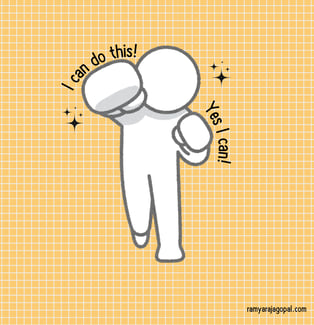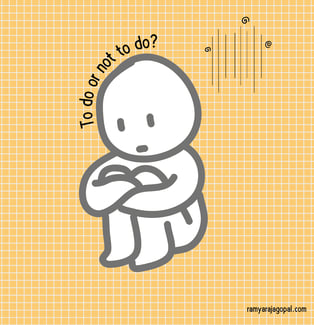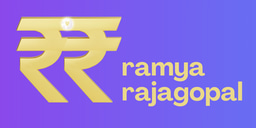How I passed my PMP® exam in 3 Weeks
On the day I got laid off from LinkedIn, which, co-incidentally, was exactly 3 months before my wedding - I decided to get my PMP certification. Was all the stress worth it?
Ramya Rajagopal
1/8/20258 min read


How I passed my PMP® in 3 Weeks
On the day I got laid off from LinkedIn, which, co-incidentally, was exactly 3 months before my wedding - I decided to get my PMP certification.
Although I had the ‘Gift of time’ given my newfound freedom from the 9 to 5 grind, I had an Indian wedding in front of me which meant that I either capitalize on the nearest slot or revisit my ‘most procrastinated task’ in March 2025, after my wedding. I, truly, had a narrow 3-week window to ‘Complete this ‘Task’! (Spoken like a true Project Manager, ha!)
Let’s do the disclaimer first. (Read this. Very important)
This article should in no way be taken word for word. Each of us is on our own journey. Time management and prioritizing other personal aspects of life takes precedence as we start adulting harder. I had a very small window for my PMP and I knew it was very risky to study, cram and take an exam which is equal parts, tough and expensive (Remember, I was laid off! And yes, budgeting and time management are P0 in my life right now.)
You may use this as a guide to navigate through your own study journey. One thing I wouldn't recommend is giving yourself a strict, crammed timeline like I did. I ended up falling sick during the following week. Could be because I was burning the candle at both ends with such a daunting syllabus or a combination of all the stress in my life forcing me to take care of my body. Either way, I was so relieved when I saw the pass certificate that I celebrated with happy tears as I sneezed and coughed my way through this milestone!
How to start your PMP preparation
The key point to note is that the PMP exam tests your ‘PMP mindset’. When I first came across this term, I actually asked ChatGPT ‘what is PMP mindset’. It was the usual text-heavy answer that was quite unhelpful. Today, I want to make it easy for you to digest the mindset needed to get through your PMP journey.
Let’s get to the basics.
PMI (Project Management Institute) is the governing body of the PMP exam. They prescribe a PMBOK guide to help you understand the syllabus and master the ‘PMP Mindset’.
Ramya’s Tips: As a Project Manager, the ‘PMP mindset’ is the one that you must ideally apply for the exam and NOT the one that you are currently applying at your workplace. Both are completely different. Trust me. I took a mock exam using the mindset that I would in my role - I ended up with a low score.
Prerequisites for the exam application.
Your qualifications along with the application that you submit to PMI needs to be pre-approved by them before you get a link to pay and set an exam date. The vetting process is quite strict, so ensure that you have all your ducks in a row.
Education & PM Experience: Have a secondary degree (high school diploma or global equivalent) and at least five years of project management experience, or a four-year degree and at least three years of project management experience.
Project Management Education: Complete 35 hours of formal project management education. (also called as 35 PDUs)
Filling up the application form:
Spend a solid couple of hours to ensure your application details are ready in a Word document. Ensure that it has a professional vibe to it. To reiterate - PMI’s application approval is quite strict - they don’t mess around.
Ramya’s Tips: I filled my form after getting through the 35 hours mandated study-material - which was to understand the PMBOK concepts, the terminology and re-look at my projects with the ‘PMI mindset’.
I spent most of my time on the Project Management experience section. I only had to show 3 years of PM experience as I have a secondary degree. This might seem easy, but I knew this section would make or break my application’s approval. I had read stories of how PMI asks for an audit of your experience where your employer has to officially sign off on your projects and confirm that you did in fact lead or be a part of them.
I did not want an audit.
In fact, I was praying for an audit-free approval.
The last thing I wanted was to approach my ex-employer after our ‘break-up’!
This is the format I had followed for the Project Management Experience write up:
Project Objective
Problem Statement
My Role as a Project Manager
My Responsibilities
Project Outcome
Impact Metrics
Project Management Methodology Used.
Feel free to edit or use your own way/ style of structuring your project write up. PMI usually takes 5-7 business days to approve your application. Mine took 4 business days. They did not ask for an audit. (Thank you, universe!)
Exam Fee Payment:
PMI provides discounts to its members. They provide a comprehensive breakup of the exam fee - with and without the membership option. I took the membership option as it matched my objectives of not just receiving a discount on exams, but also of expanding my network and my learning opportunities, by being a part of their local chapters.




Now the hard part: The studying!
35 PDUs.
You’ll find a variety of online courses on individual websites and aggregators like Udemy. I opted for Andrew Ramdayal’s Udemy course to get my mandated 35 hours of study. It came with 2 mock exams and I liked the way he explained the concepts. I made notes - Lots of it! I also noted the questions I got wrong in the quizzes and mock exams. (Important!)
David McLachlan is another great teacher! You can choose to opt for his 35 hour course on Udemy as well.
Mock Questions on YouTube
I studied Andrew Ramdayal’s Ultra Hard PMP questions and David McLachlan’s 200 Agile questions from YouTube. There are a lot of other teachers/ PMP holders with many knowledge sharing videos. Research and see what works for you.
Study Hall
This is PMI’s own platform containing mock exams, quizzes and flashcards. With my crammed limited time, I leveraged the mock exams and the mini-mocks to prepare for my exam. I noted all the incorrect answers and spent a considerable amount of time understanding why I got them wrong. Remember, it is all about the ‘PMI mindset’. I opted for the Study Hall- Essentials package.
r/PMP
This is a forum on Reddit where PMP applicants and certificate holders come together to help one another. I absolutely loved the engagement level here. Feel free to post your doubts / questions - the community members are super helpful!
Mindset
I’m not talking about the PMI mindset now. I’m going to talk about your personal mindset. Before you start this onerous journey, ask yourself - ‘why am I doing this?’.
I did it for 2 reasons.
I love everything about scenario based questions and solving case studies. There were so many of these. I actually nerded out and enjoyed my learning journey.
It was high time for me to be certified. After 12 years of being a PM, I decided to get PMP certified to upskill and go up the career ladder.
Choosing your PMP Exam type
Post your payment, PMI provides options for you to schedule your exam, which can be either online or offline. I opted for the offline exam. Although the online exam is convenient in terms of time, it didn’t work out for me. I had read accounts of test takers where they complained of having issues with internet outages and other personal struggles when they took the online exam. I wasn't going to gamble with my fate at this crucial point- I decided to head to the exam centre. The 2.5 hour commute was the only downside. The ambiance at the Pearson test centre (Lalbagh, Bengaluru - India) was an ideal stress-free one for me.
The D-Day!
Ensure to get a good night’s sleep on the day before the exam. I was anxious and managed only 3-4 hours of sleep. This, coupled with the fact that my parents were hospitalized due to pneumonia, had put me under extreme stress. I had studied way too much in such a short duration, and postponing it was out of the question. I had a plan: exam first and then visit parents (Other family members were present at the hospital to help take care of them during my exam time.) They were empathetic and ensured my efforts saw its logical conclusion.
The folks at the test centre were professional. Once the checks were completed, I was ushered into a room with cameras everywhere. The PMP exam gives you two ten-minute breaks. Use them wisely! I can’t stress this enough. The lack of sleep and the bright monitors dried up my eyes and my grey-matter - the breaks kept me sane.
Questions on Exam Day
Many Redditors mentioned that questions from the Study Hall are often repeated on the exam. Sadly, that wasn’t the case for me. I found the first two sections of the exam to be extremely difficult. I got 4-5 graphical questions, 1-2 calculation based questions and the rest were scenario based questions. By the time I had reached the third section, I was a bit at ease.
At the end, I had 15 minutes left on my timer, so I took the time to go through my final section answers. I went through my rough notes on the notepad provided and sent a prayer to the universe to help me pass the exam.
I was exhausted - mentally and physically - with the entire journey.
I just wanted a pass.
It was my ‘Dracarys’ moment as I hit the ‘Submit Exam’ button.
The Result
Post the final submission, I was escorted out of the exam room by a Pearson representative who then asked me to wait in the common area wherein they would provide a ‘provisional pass/fail’ certificate. This turned out to be the longest 5 minute wait of my life!
When the representative handed me my certificate, I took a peek and read the word ‘Congratulations..’ Immense relief and joy took over my emotions. Yay! I put the certificate in my bag and rushed out.
My overthinking PM mindset kicked in immediately, marking its daily attendance. What if it said ‘Congratulations for attempting the exam, but you failed’. (I know, it’s silly. But a chronic overthinker is the most creative in making up silly scenarios). I re-read the entire provisional certificate.
I had indeed passed. (Read this in Morgan Freeman’s voice. Ha!)
Ten hours later, I got an official email from PMI congratulating me. With this, my PMP exam journey came to an end.
50% of the PMP exam consists of the ‘Process’ section, where I got an Above Target score.
42% consists of the ‘People’ section, where I got a Target score.
8% consists of the ‘Business Environment’ section. Unfortunately, I got a Below Target score here. (I was sad believing I could have done better, but given the limited time and the unlimited chaos in my life - I know I did my best.)
What Next?
As a member of the PMI, I now look forward to being a part of their various chapters, networking with other PMP holders, mentoring aspiring PMP candidates and learning new things every day.
The entire 3 weeks were an absolute roller coaster of learning, stress and mental exhaustion for me, but looking at the ‘Pass’ certificate and the PMP® next to my name made this stressfully chaotic challenge worth it!
Everybody bounces back; it's not about how hard you fall but how strong you rise. 💪🦸🏻♀️
Ramya Rajagopal, PMP® is a Senior Project/ Program Manager turned Writer and Canva Designer.
Having worked at varied industries (Investment Bank, Wealth Management and Product Technology) she nerds on learning new things every day. She is also a Published author and hobbyist illustrator.
Say hi to her at rr@ramyarajagopal.com


ramyadesignsdata@gmail.com
© 2025. All rights reserved.
As your data and design buddy, I write about things that might interest you...
Website designed with 💗 by ramya rajagopal
